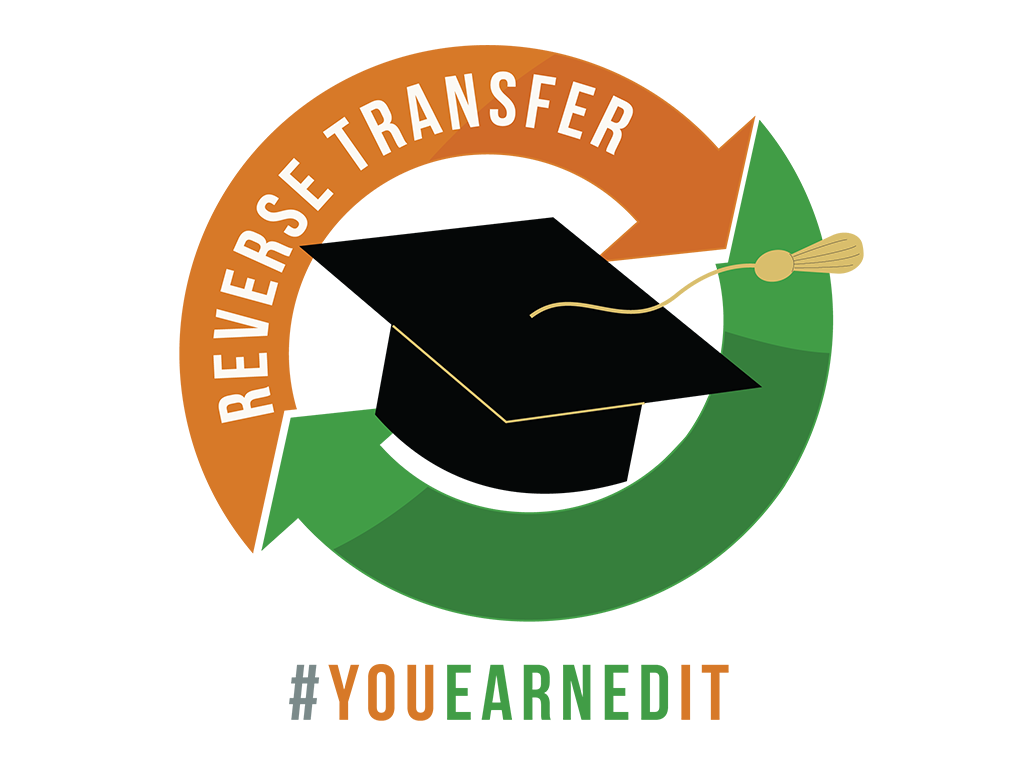Reverse Transfer
Reverse transfer at FAMU allows students who started their academic journey at a Florida College System (FCS) institution to seamlessly continue their education at our university while still having the opportunity to earn their Associate of Arts (A.A.) degree.
Student Eligibility Criteria
Students who are currently enrolled at FAMU and who have not yet earned an A.A. or Bachelor’s degree may be eligible for ‘Reverse Transfer’ if they:
- Earned over 30 college credit hours at a single FCS institution.
- Transferred to FAMU before earning an AA degree
- Completed a minimum of 60 hours of college credit total
- Completed general education requirements of either their previous FCS institution or of FAMU
- Are in good academic standing and are current with financial obligations at FAMU
- Are in good academic standing and be current with financial obligations at the previous FCS institution
- Have met the Florida Civic Literacy Requirement
- Have met the ‘College-Level Communication and Computation Skills' (Gordon Rule) Requirements
- Have met the ‘two years of Foreign Language study’ requirement, FAMU Graduation Requirements & Procedures
- Meet any other associate in arts degree graduation institutional requirement of the degree-granting FCS institution.

.
Benefits of an Associate of Arts (A.A.) degree.

- Possessing both an AA Degree and a bachelor’s degree enhances job prospects and showcases a broader range of skills on a resume.
- The associate’s degree is a rapidly recognized credential by employers, aiding in recruitment and hiring.
- Completing an associate’s degree increases the likelihood and motivation to finish a bachelor’s degree.
Ok, I’m Interested! What’s My Next Step?
✔️ Maintaining Good Student Status: Be in good academic standing and be current with financial obligations at FAMU and
the previous FCS institution
✔️ Review of Eligibility: If you have completed more than 30 credits from an FCS institution and meet the Student Eligibility Criteria, you may qualify for ‘Reverse Transfer'.
✔️ Notification Process: At the end of each semester, the FAMU Registrar’s Office thoroughly reviews academic
records. If you meet the criteria, you can expect an email notification detailing
your eligibility for ‘Reverse Transfer’ approximately six weeks after the semester
ends.
✔️ Follow-Up Instructions: Once you receive the email notification, carefully follow the outlined steps for
further action. These instructions will guide you through the process of transferring
your transcript data from FAMU to your previous FCS institution.
✔️ Transcript Transfer: Submit any required forms or documents to authorize the transfer of your transcript
data from FAMU to your previous FCS institution.
✔️ Confirmation of A.A. Degree: Once the transcript transfer process is complete, your previous FCS institution will
review the transferred credits and confirm your eligibility for the A.A. degree.
✔️ Receive A.A. Degree: Upon confirmation, your previous FCS institution will award you the Associate of
Arts (A.A.) degree.
✔️ Continue Bachelor’s Degree: With your A.A. degree now earned, you can continue pursuing your bachelor’s degree
at FAMU.
✔️ Seek Assistance if Needed: Should you have any questions, please review our FAQs, or if you require further assistance, please do not hesitate to reach out to your university academic advisor or the Registrar’s Office.
‘Reverse Transfer’ FAQs
Whether you’re wondering about eligibility criteria, credit hour requirements, or degree-granting institutions, you’ll find the information you need to navigate your reverse transfer journey.
What is a Florida College System (FCS) Institution?: A public postsecondary educational institution that grants associate in arts degrees, associate in science degrees, associate in applied science degrees, certificates, awards, diplomas, and baccalaureate degrees as provided by law. The Florida College System includes 28 institutions throughout the state of Florida. Florida College System (fldoe.org)
What is a State University System (SUS) Institution?: A public postsecondary educational institution that offers Bachelor’s, Master’s, Advanced Master’s, Engineering, Specialist, Professional Doctorate, and Research Doctorate degrees. Florida’s public university system includes 12 universities. Universities - State University System of Florida (flbog.edu)
Participating Florida College System
|
Participating State University System
|
|
Broward College Chipola College College of Central Florida Daytona State College Eastern Florida State College Florida Gateway College Florida SouthWestern State College Florida State College at Jacksonville Gulf Coast State College Hillsborough Community College Indian River State College Lake-Sumter State College Miami Dade College North Florida College Northwest Florida State College Palm Beach State College Pasco-Hernando State College Pensacola State College Polk State College Santa Fe College Seminole State College of Florida South Florida State College St. Johns River State College St. Petersburg College State College of Florida, Manatee-Sarasota Tallahassee Community College The College of the Florida Keys Valencia College |
Florida Agricultural & Mechanical University ⭐ Florida Atlantic University Florida Gulf Coast University Florida International University Florida Polytechnic University Florida State University New College of Florida University of Central Florida University of Florida University of North Florida University of South Florida University of West Florida |
Students must have earned over 30 college credits from a single Florida College System (FCS) institution, including credit from acceleration methods like credit-by-examination, dual enrollment, or prior learning assessment.
Additionally, candidates must have completed a minimum of 60 credit hours of college-level coursework.
If a reverse transfer candidate attended more than one FCS institution prior to transferring to an SUS institution, the degree-granting institution will be the FCS institution where the student earned the most credits, provided the student earned more than 30 credits at that institution. In the event the student has earned the same number of credits and meets the degree requirements at two or more FCS institutions, the FCS institution that the student attended most recently will be considered as the degree-granting institution.
Reverse transfer is specifically designed for students transferring from FCS institutions, but you can inquire with the Registrar’s Office for information on transfer options from other institutions.
No, the reverse transfer program does not apply to associate in science degree-seeking students.
The reverse transfer program is specifically designed to assist former FCS students who have transferred to a SUS institution and want to earn or complete an Associate in Arts (AA) degree.
No. If you have already earned a bachelor’s degree, you are not eligible for reverse transfer, but you can inquire with the Registrar’s Office for information on transfer options for students such as yourself.
There are typically no additional fees or costs associated with participating in reverse transfer. However, students may incur standard transcript processing fees when transferring credits.
We offer various resources to assist you in navigating the reverse transfer process, including advising services, online guides, and support from the Registrar’s Office.
You can track the progress of your reverse transfer application by regularly checking your email for notifications from the Registrar’s Office or by contacting them directly for updates on your application status.





